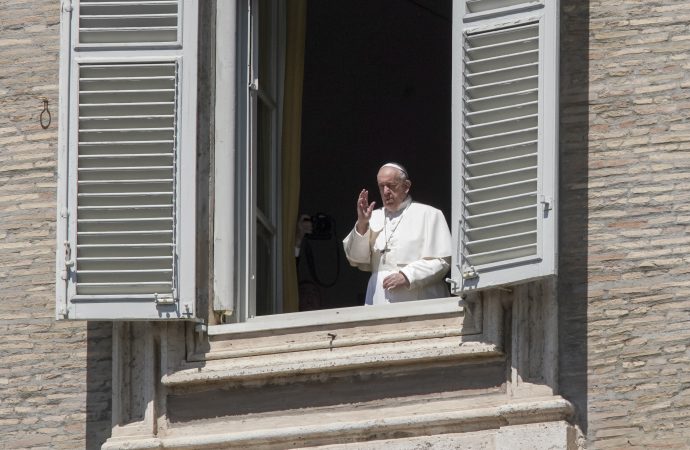The pope's request for "obedience" to both pastoral and political mass restrictions

Since Pope Francis began streaming his daily Mass from the residence of Santa Marta in the Vatican, many people around the world have been grateful for the opportunity to hear the pope's words and to participate, albeit virtually, in the its liturgy, helping to break the isolation of the coronavirus quarantine.
Tuesday morning, probably, no one was more grateful than the Italian Prime Minister Giuseppe Conte.
Conte obtained an extremely necessary favor, given that the pontiff had essentially tripped the switch to increase Catholic resistance to the Prime Minister's recovery program by asking for "prudence and obedience". What remains to be seen is whether, in addition to pastoral conviction, the expression was also a shrewd political tactic, effectively putting the Italian leader in the pope's debt and creating capital that Italian bishops can now spend in negotiations with the government.
Francesco began with a short prayer intention, as was his custom, and today was dedicated to what the Italians call "Phase 2", which means the gradual reopening of the country after two months of blockade.
The plan triggered a strong national backlash after Conte announced it on Sunday, largely because while authorizing small-scale funeral celebrations, he made no provision for the resumption of public masses despite repeated appeals from the powerful Italian episcopal conference. , CEI, to be able to do so, by taking precautions such as social distancing and masks and gloves.
Media reports suggest that Conte's technical-scientific committee overseeing Phase 2 has judged that for now the risks of people's movements and contacts within churches generated by the restart of public Masses are too great and that it could be May 25 at the earliest when that decision is reviewed in light of the infection rate.
In response to the decision, the CEI published a test note on Sunday evening stating that "the Italian bishops cannot accept to see the exercise of freedom of worship compromised".
An Italian bishop, Giovanni D'Ercole of Ascoli Piceno, published a video message in which he declared: "This is a dictatorship, to prevent access to worship, which is one of our fundamental freedoms".
D'Ercole's voice carries weight, because from 1998 to 2009 he was a senior official in the first section of the Vatican Secretariat of State, in charge of church governance, and is also a long-standing device on Italian TV.
Throughout Monday, criticism of Conte's decree increased, so much so that in the evening a news point jokingly announced the formation of a new political party called PTCC, which represents the Party of Tutti Contra Conte or the "Party of all against Conte “.
Pope Francis enters, Tuesday morning.
"At this time when they begin to make arrangements to come out of quarantine, we pray the Lord to give his people, all of us, the grace of prudence and obedience to those arrangements, so the pandemic does not return," Francis said. .
Up and down Italy, that crumbling sound you heard was about twenty Italian bishops preparing to issue statements criticizing the government that, after the pope finished, had thrown their drafts into the garbage cans.
Before that time, many Italian bishops would probably have assumed that Francis supported their protests. The Vatican news service reported a story titled "Italian Bishops Against Government Decision," and official spokespersons never denied reports that the CEI statement was issued with the approval of the Vatican Secretariat of State.
Furthermore, everyone here remembers that the next day Cardinal Angelo De Donatis, vicar of Rome, announced the total closure of Roman churches in mid-March, Pope Francis the next morning proclaimed "drastic measures are not always good", and more late that day, his almoner, the Polish cardinal Konrad Krajewski, unfortunately violated the decree by opening his titular church, Santa Maria Immacolata in the Esquilino district of Rome.
Within hours, De Donatis backed down and decreed that the churches could remain open for private prayer.
However, rather than joining criticism, the pope this morning did in fact assure that Conte's recovery plan would not have been DOA due to Catholic resistance.
Francis must have known that his words would be perceived as telling the Italian bishops to surrender. This is how it is played in the first round of media coverage, with a newspaper blaring at the top of its lungs, "The Pope is beating the brakes on the bishops" and another suggests more delicately that Francis "seems to want to restore serenity in the Catholic world and among the bishops. ".
Despite his commitment to collegiality, he was willing to take the risk of those impressions, which suggests that he believes something important is at stake. Undoubtedly, the heart of the concern is that the Church should not do anything that could risk a new cycle of contagion, thus endangering life.
The situation in Italy in terms of church reopening is complicated, in part because while there are many large churches here with soaring ceilings, plenty of space to maintain social distance and excellent airflow, there are also dozens of small ones parishes, oratories and chapels where spaces are cramped and which are not equipped to handle the kind of crowd control that has become routine in, say, grocery stores and producing stands. As a pastor, Francis probably doesn't want to do anything hasty.
Yet it would be naive to ignore that Francis's statement also has political significance, in the sense that he has just given Conte some breathing room as his "Phase 2" begins. The pope knows that the government has promised to issue a protocol on the resumption of public masses soon - and, perhaps, Conte will now be inclined to find a way to return Francis' favor.